Garden Maintenance in Richmond: Expert Tips for a Lush and Healthy Garden
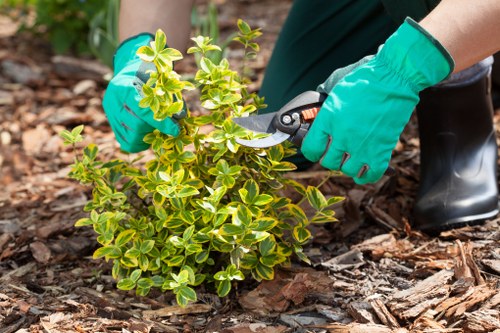
Maintaining a beautiful garden requires dedication, knowledge, and the right techniques. In Richmond, where the climate and soil conditions can vary, understanding the specific needs of your garden is crucial for ensuring plants thrive.
Whether you're a seasoned gardener or just starting out, regular garden maintenance is essential for promoting plant health, preventing diseases, and enhancing the overall aesthetic of your outdoor space.
In this comprehensive guide, we'll explore various aspects of garden maintenance in Richmond, providing you with actionable tips and expert advice to keep your garden in top shape throughout the year.
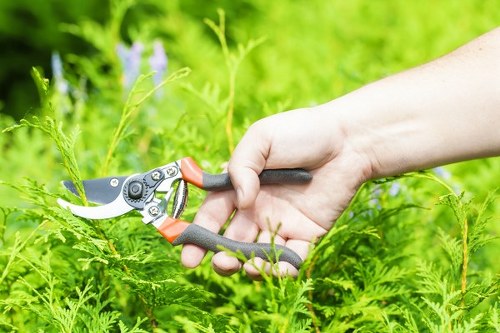
Importance of Regular Garden Maintenance
Regular garden maintenance is the foundation of a thriving garden. It involves a series of tasks that help maintain the health and appearance of your plants.
Key benefits of regular maintenance include:
- Preventing plant diseases and pest infestations
- Promoting healthy growth and vibrant blooms
- Enhancing the beauty and functionality of your outdoor space
- Minimizing weed growth and maintaining soil quality
By staying on top of maintenance tasks, gardeners can ensure that their gardens remain resilient against the challenges posed by Richmond's unique climate.
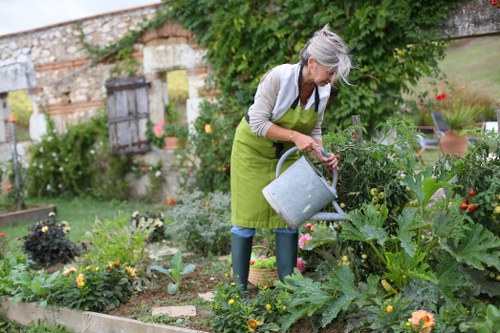
Seasonal Garden Care in Richmond
Different seasons bring different challenges and opportunities for your garden. Understanding how to adapt your maintenance routine can make a significant difference in your garden's success.
Spring
Spring is a critical time for garden maintenance. It's the ideal time for planting new flowers, vegetables, and shrubs. Additionally, pruning existing plants helps stimulate healthy growth.
Summer
During the summer months, focus on watering, weeding, and pest control. Ensuring your plants receive adequate moisture is essential for preventing stress and promoting blooming.
Autumn
Autumn is the time to prepare your garden for the colder months. This includes clearing fallen leaves, mulching, and planting bulbs for spring.
Winter
In winter, protect your plants from frost and snow by using covers and ensuring proper drainage to prevent root damage.
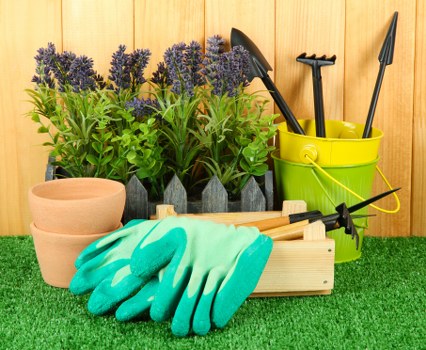
Essential Tools and Equipment
Having the right tools is vital for efficient garden maintenance. Investing in quality equipment can save time and reduce the risk of injury.
- Pruning shears for trimming plants
- Garden gloves to protect your hands
- Watering cans or hoses for irrigation
- Wheelbarrows for transporting materials
- Weeders to remove unwanted plants
Maintaining your tools ensures they remain effective and safe to use. Regular cleaning and storage prolong the life of your gardening equipment.
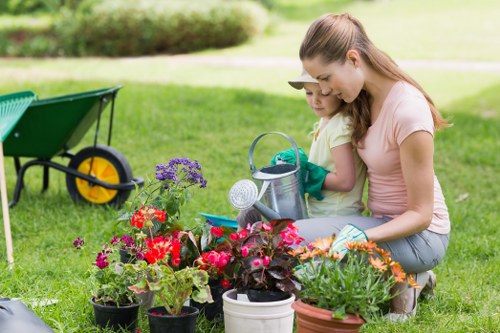
Common Garden Pests and Solutions
Pests can pose a significant threat to your garden's health. Identifying and managing these pests early can prevent extensive damage.
Common pests in Richmond gardens include:
- Aphids: These small insects suck sap from plants, causing wilting and stunted growth.
- Slugs and snails: They feed on leaves and stems, often leaving irregular holes.
- Spider mites: These tiny pests can cause discoloration and defoliation.
Effective pest management strategies include natural predators, organic pesticides, and proper garden hygiene to minimize hiding spots.

Choosing the Right Plants for Richmond's Climate
Selecting plants that are well-suited to Richmond's climate ensures better growth and reduces maintenance efforts.
Native plants are typically more resilient and require less care. Consider incorporating species like:
- Redbud trees
- Virginia sweetspire shrubs
- Black-eyed Susans
- Lilacs
Additionally, understanding your garden's microclimate—such as sun exposure and soil type—can help in choosing plants that will thrive in specific areas of your garden.

DIY Garden Maintenance vs. Professional Services
Deciding between DIY maintenance and hiring professionals depends on various factors, including the size of your garden and your expertise.
Benefits of DIY maintenance:
- Cost-effective
- Personal satisfaction
- Flexibility in scheduling
Advantages of professional services:
- Expert knowledge and experience
- Access to specialized equipment
- Time-saving
For larger or more complex gardens, professional maintenance can ensure optimal care and address issues that might be challenging for amateur gardeners.

Sustainable Practices for Your Richmond Garden
Adopting sustainable gardening practices not only benefits the environment but also enhances the health of your garden.
Composting
Creating a compost pile recycles organic waste into nutrient-rich soil, reducing the need for chemical fertilizers.
Rainwater Harvesting
Collecting rainwater helps conserve water and provides your plants with a natural, chemical-free source of hydration.
Mulching
Applying mulch retains soil moisture, suppresses weeds, and regulates soil temperature, promoting healthier plant growth.

Creating a Maintenance Schedule
Developing a structured maintenance schedule ensures that all necessary tasks are completed systematically, preventing issues from being overlooked.
- Weekly Tasks: Weeding, watering, and inspecting plants for pests.
- Monthly Tasks: Pruning, fertilizing, and soil testing.
- Seasonal Tasks: Planting, mulching, and preparing for weather changes.
Using a calendar or garden planner can help track these tasks and keep your garden maintenance organized.

Enhancing Garden Aesthetics
Beyond basic maintenance, enhancing the aesthetics of your garden can create a welcoming and enjoyable outdoor space.
Pathways and Lighting
Adding pathways and garden lighting can improve the functionality and beauty of your garden, making it accessible and charming during evening hours.
Decorative Elements
Incorporate elements like garden statues, water features, or seating areas to add character and personal touches to your garden.
Color coordination with flowers and plants can create visually appealing landscapes that reflect your personal style.

Maintaining Garden Health
Ensuring the overall health of your garden involves regular monitoring and prompt action when issues arise.
Signs of healthy plants include vibrant foliage, robust growth, and resistance to pests and diseases.
- Regularly check for discoloration or unusual spots on leaves.
- Monitor soil moisture levels to prevent over or under-watering.
- Ensure proper air circulation to reduce the risk of fungal infections.
Addressing problems early can prevent minor issues from escalating into major setbacks.

Maximizing Garden Productivity
For those interested in edible gardens, maximizing productivity is key to a fruitful harvest.
Crop rotation helps maintain soil fertility and reduces pest and disease buildup.
- Plan your garden layout to rotate plant families each season.
- Incorporate companion planting to naturally deter pests.
- Use raised beds or containers to improve drainage and soil quality.
Implementing these strategies can lead to a more productive and sustainable garden.

Watering Techniques
Proper watering techniques are crucial for healthy plant growth. Overwatering and underwatering can both lead to plant stress and disease.
Deep watering encourages roots to grow deeper, making plants more resilient to drought conditions.
Drip Irrigation
Drip irrigation systems deliver water directly to the plant roots, reducing water waste and minimizing leaf moisture that can promote disease.
Mulch Application
Applying mulch helps retain soil moisture, reducing the frequency of watering required.

Pruning and Trimming
Regular pruning and trimming are essential for maintaining the shape and health of your plants.
Benefits of pruning:
- Encourages new growth
- Enhances airflow within the plant canopy
- Prevents the spread of diseases
Use sharp, clean tools to make precise cuts and avoid damaging the plant.

Soil Health Management
Healthy soil is the foundation of a thriving garden. Maintaining soil health involves regular testing and amendments.
Soil testing helps determine nutrient levels and pH balance, guiding fertilizer and amendment applications.
- Add organic matter like compost to improve soil structure
- Use natural fertilizers to provide essential nutrients
- Adjust pH levels based on test results to optimize plant growth
Healthy soil supports strong root systems and enhances plant resilience.

Dealing with Weeds
Weeds compete with your plants for nutrients, water, and light. Effective weed management is necessary to maintain a healthy garden.
Preventative measures:
- Mulching to suppress weed growth
- Regular weeding to prevent seed dispersion
- Choosing ground covers that outcompete weeds
A combination of manual removal and organic herbicides can keep weeds under control without harming desirable plants.

Fertilization Strategies
Fertilizing your garden provides essential nutrients that support plant growth and flowering.
Types of fertilizers:
- Organic fertilizers like compost and manure
- Synthetic fertilizers for quick nutrient release
- Slow-release fertilizers for sustained feeding
Applying the right type of fertilizer at the appropriate time ensures plants receive the nutrients they need without excess buildup.

Pest-Resistant Plant Varieties
Choosing plant varieties that are resistant to common pests can reduce maintenance efforts and improve garden health.
Benefits:
- Reduced need for chemical pesticides
- Lower risk of disease transmission
- Enhanced environmental sustainability
Research and select plant species known for their natural resistance to pests prevalent in Richmond.

Using Mulch Effectively
Mulching is a key practice in garden maintenance, offering multiple benefits for plant health and soil quality.
Advantages of mulching:
- Retains soil moisture
- Suppresses weed growth
- Regulates soil temperature
Apply a 2-3 inch layer of mulch around plants, ensuring it doesn't touch the plant stems to prevent rot.

Leaf and Debris Removal
Regularly removing fallen leaves and garden debris prevents the buildup of mold and pests, maintaining a healthy garden environment.
Methods:
- Raking leaves into compost piles
- Using leaf blowers for efficient cleanup
- Implementing ground covers to reduce debris accumulation
Clean gardens are less prone to diseases and provide a tidy appearance.

Integrated Pest Management (IPM)
IPM is a sustainable approach to managing pests by combining biological, cultural, and chemical practices.
Steps in IPM:
- Monitor and identify pests accurately
- Assess the extent of the infestation
- Implement control methods: biological controls, habitat manipulation, and chemical controls as a last resort
IPM minimizes environmental impact while effectively managing pest populations.

Creating a Biodiverse Garden
Promoting biodiversity in your garden encourages a balanced ecosystem, supporting beneficial insects and wildlife.
Benefits:
- Natural pest control through predators like ladybugs and bees
- Enhanced pollination for better plant yields
- Improved soil health through diverse plant species
Incorporate a variety of plants, including flowers, herbs, and shrubs, to attract different types of beneficial organisms.

Composting for Garden Health
Composting transforms organic waste into valuable fertilizer, enriching your garden's soil and reducing landfill waste.
How to start composting:
- Choose a composting method: bin, pile, or tumbler
- Combine green materials (vegetable scraps, grass clippings) with brown materials (leaves, straw)
- Maintain moisture and aeration by turning the compost regularly
Utilize the finished compost to improve soil structure and provide essential nutrients to your plants.

Final Thoughts on Garden Maintenance in Richmond
Effective garden maintenance in Richmond involves a combination of regular care, sustainable practices, and informed decision-making.
By implementing the tips and strategies outlined in this guide, you can achieve a vibrant and healthy garden that enhances your outdoor living space.
Don't wait to transform your garden. Contact us today to learn more about our professional garden maintenance services in Richmond.
